Have you ever had someone tell you: “You can’t love anyone until you learn to love yourself”?
And did you want to strangle the person who told you that?
Though that wouldn’t be very loving, would it?
Yes, it’s true that if we don’t love ourselves, it’s difficult to love anyone else, but this is easier said than done.
Why is it important that we love ourselves? And why can’t we start with loving others first?
Take the Buddhists, for example. In the Buddhist tradition, they talk about the importance of cultivating compassion for others as a spiritual practice. In other words, they start with loving others first.
Back when I was in ministerial school at Holmes Institute, I took a course in Buddhism. The teacher was B. Alan Wallace, an expert on Tibetan Buddhism. At one point, he told a fascinating story about this issue of self love and spiritual practice.
In 1990, Wallace was at a conference with the Dalai Lama and a bunch of other folks – monks, psychologists, and neuroscientists. The theme of the conference was the role of the mind and emotions in healing.
A well-known Western Buddhist teacher, Sharon Salzberg, posed a question to the Dalai Lama.
It was a version of the question I posed at the top of this blog: Is it better to start our spiritual practice with loving ourselves or loving others?
Salzberg stated that she was coming from a tradition where students first learn to cultivate compassion for themselves, and then turn this compassion toward others. She said many of her students suffer from a lack of self worth. They don’t think they’re worthy of happiness. So that’s why she starts them focusing on self love.
But she wondered if this might be a covert form of narcissism. She wondered if the Dalai Lama, coming from the Tibetan Buddhist tradition, might view this Western practice as unskillful or even dangerous.
And the most amazing thing happened.
The Dalai Lama had no idea what she was talking about. I mean, he knew she was talking about Buddhist practice. He is Mr. Awesome Buddha Guy, after all.
But he didn’t understand the self-hatred piece.
He asked the participants in the conference, all Westerners, if they experienced self-hatred and self-contempt. Every hand went up.
He then consulted the Tibetan monks who were with him, most of whom didn’t speak English. They don’t even have a word for “guilt” in the Tibetan language. They could not relate to the concept at all.
The Dalai Lama then turned back to Salzberg and said – Yes, given the self-hatred you Westerners are carrying, starting your practice with compassion toward the self would be an excellent thing. A most excellent way to begin.
I loved this story. And I have to say, I found it a bit of a relief.
I have often wondered the same thing as Salzberg. Is it really okay to direct love and affection toward the self? Couldn’t this be a trap – a hard-core belly-button self-absorption?
But even those questions, in and of themselves, speak to a view that is based in self-contempt. Or at least a suspicion of any practice that might – God forbid – leave us feeling good about ourselves.
But the Dalai Lama gave the practice of self-compassion a thumbs up!
And I, for one, can speak to the power of turning a loving and accepting gaze on myself. Not in a show-offy, better-than-others way. Instead, such practice generates a kindness and compassion based on true spiritual sight.
Years ago, I took a class on World Religions. When we came to the piece on Christianity, the professor broke down the teachings of Jesus into three simple ideas:
1. The Divine loves you passionately, powerfully, overwhelmingly.
2. You can experience this love.
3. Once you do, you can share this love with others.
This makes a whole lot more sense than all the satan/sinning/penance stuff that’s gotten thrown in the mix.
Indeed, these three principles of Jesus are basically what the Dalai Lama was prescribing to Western students of the Buddhist path. Start with cultivating self-love, which is ultimately the love of the Divine, and then turn this love toward others.
Now that’s a conference I’d love to attend. The Dalai Lama and Jesus, rapping about love. Real love. The kind that can fall on ourselves and others.
Because it’s all the same thing.
How do you relate to the phrase: “You can’t love anyone until you learn to love yourself”? Share your comments below!
Want Sneak Peeks, Insider Info, and other Fun Stuff?! Become a member of OhMyGod Life!

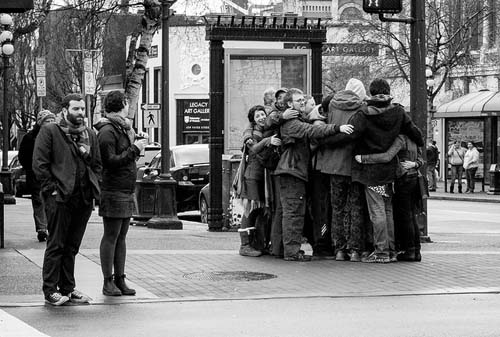

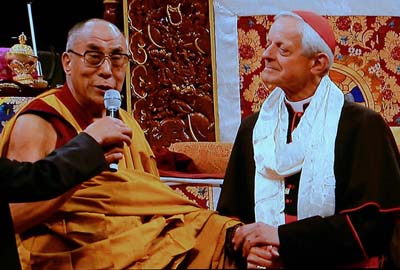
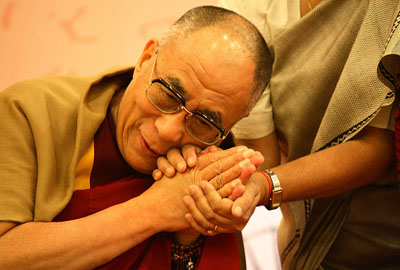
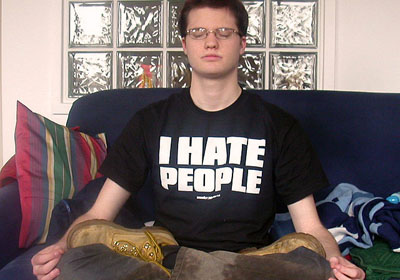
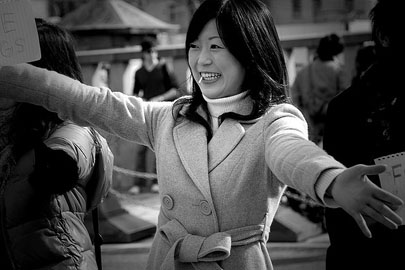

I’d certainly agree — until we love ourselves, we just don’t have much love to give.
But the tricky part is — how do we love ourselves?
The best approach I’ve ever found is to make feeling emotionally good our highest priority: “Nothing is more important than that I feel good,” and then let our life reconfigure around that intention.
We make in-the-moment choices to let go of envy, worry, anger, resentment, self-pity and other bad-feeling thoughts simply because they do feel so bad and we no longer care to punish ourselves in that way.
We make in-the-moment choices to think thoughts of appreciation, anticipation, satisfaction, fantasy, etc. because they do feel so good and we want to immerse ourselves in that.
We can train ourselves to be really loving to ourselves in those crucial ways.
And then from a happy place, where we’re seeing life in the same way as our joyful Inner Being, we can’t help but be an uplifter and role model of thriving to everyone who comes our way, assuming that they’re open to that. If they’re not open to that…well, that’s their business, not ours.
If we get the cart before the horse and try to go forth loving others in some noble, perhaps worried way without being fully aligned with our own divine Inner Being, our efforts will fall flat. If we’re not vibrating in a good-feeling place, we’ll lack the inspiration and other wherewithal to truly help. But when we make it about our own joyful alignment, we’ll be of immense benefit without even trying.
Hi Karen!
I agree – getting to a place of alignment makes self-love a natural byproduct of the process. And when that happens, we can’t help but love others – and uplift them in the process. (If they’re open to it, like you say.)
I was fascinated by the cultural difference in this process of self-love. Before I heard this story about the Dalai Lama, I hadn’t realized that self-hatred was so much more acute in the West. Actually, in the story, they said that it tends to be worse in Americans – more so than Europeans. This is fascinating to me, especially given our emphasis on individuality here in the States. Ah well, luckily many of us are learning ways to truly love ourselves – and becoming more like the Dalai Lama in the process! 🙂
XOZ